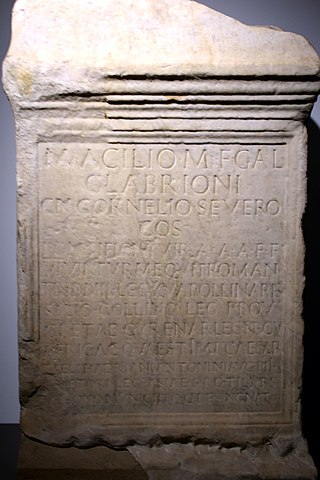Related Research Articles
This article concerns the period 69 BC – 60 BC.
Year 66 BC was a year of the pre-Julian Roman calendar. At the time it was known as the Year of the Consulship of Lepidus and Tullus. The denomination 66 BC for this year has been used since the early medieval period, when the Anno Domini calendar era became the prevalent method in Europe for naming years.
Year 67 BC was a year of the pre-Julian Roman calendar. At the time it was known as the Year of the Consulship of Piso and Glabrio. The denomination 67 BC for this year has been used since the early medieval period, when the Anno Domini calendar era became the prevalent method in Europe for naming years.
The gens Acilia was a plebeian family at ancient Rome, that flourished from the middle of the third century BC until at least the fifth century AD, a period of seven hundred years. The first of the gens to achieve prominence was Gaius Acilius, who was quaestor in 203 and tribune of the plebs in 197 BC.
The gens Gabinia was a plebeian family at ancient Rome. Members of this gens first appear in the second century BC. The nomen derives from the city of Gabii, east of Rome.

The Mithridatic Wars were three conflicts fought by the Roman Republic against the Kingdom of Pontus and its allies between 88 and 63 BCE. They are named after Mithridates VI, the King of Pontus during the course of the wars, who initiated the hostilities with Rome. Mithridates led the Pontic forces in every war. The Romans were led by various generals and consuls throughout the wars, namely Lucius Cornelius Sulla, Lucius Licinius Lucullus, and Gnaeus Pompey Magnus.

Manius Acilius Glabrio was a plebeian Roman politician and general during the Republican. He served as consul in 191 BC while Rome was at war with the Seleucid Empire. He defeated Emperor Antiochus the Great at Thermopylae, helping establish Roman unipolar control over the Mediterranean, and was awarded a triumph. Credible accusations that he had embezzled spoils from his conquests in Greece while consul caused him to withdraw from his attempt to run for censor, after which he largely retired from public life.
Gaius Manilius was a Roman tribune of the plebs in 66 BC. He is primarily known for his Lex Manilia, the bill which gave Pompey the Great command of the war against Mithridates.
Lex Acilia Calpurnia was a law established during the Roman Republic in 67 BC mandating permanent exclusion from office in cases of electoral corruption. The law was passed by and named for the year's consuls Manius Acilius Glabrio and Gaius Calpurnius Piso.

Manius Aquillius was a Roman politician and general during the late Roman Republic. He was a member of the ancient Roman gens Aquillia, probably a son of Manius Aquillius, consul in 129 BC. Aquillius served as Consul of Rome with Gaius Marius in 101 BC. Before his consulship, during the Cimbrian War, he had served as a legate under Marius in Gaul. He played a pivotal role during the Battle of Aquae Sextiae where he surprised the Teutones by attacking them from behind. As consul he crushed a slave revolt in Sicily by defeating Athenion of Cilicia in single combat, a victory that was commemorated by Aquillius's family by coinage issued decades later. At the start of the First Mithridatic War he was defeated and captured by Mithridates VI of Pontus who had him executed by pouring molten gold down his throat.

The lex Manilia was a Roman law passed in 66 BC granting Pompey the military command in the East against Mithridates VI of Pontus.

The Asiatic Vespers refers to the massacres of Roman and other Latin-speaking peoples living in parts of western Anatolia c. early 88 BC by forces loyal to Mithridates VI Eupator, ruler of the Kingdom of Pontus, who orchestrated the massacre in an attempt to rid Asia Minor of Roman influence. An estimated 80,000 people were killed during the episode. The incident served as the casus belli or immediate cause of the First Mithridatic War between the Roman Republic and the Kingdom of Pontus.
Manius Acilius Glabrio was a Roman Senator who served as consul ordinarius in AD 91 as the colleague of Trajan, afterwards emperor. Although one of many senators executed during the reign of Domitian on the alleged grounds of plotting against the emperor, he was remembered by his contemporaries best for his strength. Domitian summoned Glabrio during the latter's consulate to his Alban estate during the festival of the Juvenalia to kill a large lion; not only did Glabrio despatch the beast, but he escaped all injury. Following his defeat of the lion, Glabrio was banished by Domitian, then executed while in exile.

Bithynia and Pontus was the name of a province of the Roman Empire on the Black Sea coast of Anatolia. It was formed during the late Roman Republic by the amalgamation of the former kingdoms of Bithynia and Pontus. The amalgamation was part of a wider conquest of Anatolia and its reduction to Roman provinces.
Marcus Junius D. f. D. n. Silanus was a member of the Junii Silani, a noble Roman family, who held the consulship in 109 BC.
The gens Manilia was a plebeian family at ancient Rome. Members of this gens are frequently confused with the Manlii, Mallii, and Mamilii. Several of the Manilii were distinguished in the service of the Republic, with Manius Manilius obtaining the consulship in 149 BC; but the family itself remained small and relatively unimportant.

Manius Acilius Glabrio Gnaeus Cornelius Severus was a senator of the Roman Empire. He was consul ordinarius in 152 with Marcus Valerius Homullus as his colleague. Acilius Glabrio is known almost solely from surviving inscriptions.
The gens Rubria was a plebeian family at ancient Rome. Members of this gens are first mentioned in the time of the Gracchi, but they did not rise to prominence until imperial times. The first of the Rubrii to obtain the consulship was Rubrius Gallus, some time before AD 68.
References
- Dio Cassius, Roman History, 36.14.4, 17.1, 38–41.2, 43.1
- Cicero, Pro lege Manilia, 2. 9;
- Appian, The Foreign Wars, the Mithridatic War, 90.